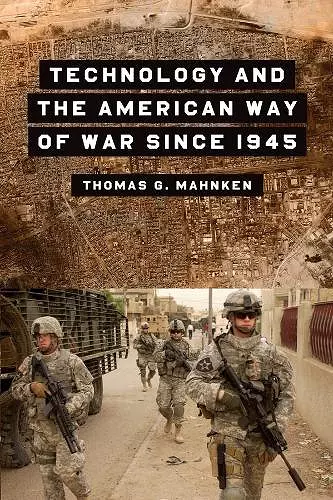Technology and the American Way of War Since 1945
Format:Paperback
Publisher:Columbia University Press
Published:23rd Jul '10
Currently unavailable, and unfortunately no date known when it will be back

From the atom bomb to the spy satellites of the Cold War, the strategic limitations of the Vietnam War, and the technological triumphs of the Gulf war, Thomas G. Mahnken follows the development and integration of new technologies into the military and emphasizes their influence on the organization, mission, and culture of the armed services. In some cases, advancements in technology have forced different branches of the military to develop competing or superior weaponry, but more often than not the armed services have molded technology to suit their own purposes, remaining resilient in the face of technological challenges. Mahnken concludes with the reemergence of the traditional American way of war, which uses massive force to engage the enemy, and discusses how the armed forces could take advantage of the information revolution.
No nation in recent history has placed greater emphasis on the role of technology in planning and waging war than the United States. In World War II the wholesale mobilization of American science and technology culminated in the detonation of the atomic bomb. Competition with the Soviet Union during the Cold War, combined with the U.S. Navy's culture of distributed command and the rapid growth of information technology, spawned the concept of network-centric warfare. And America's post-Cold War conflicts in Iraq, the former Yugoslavia, and Afghanistan have highlighted America's edge. From the atom bomb to the spy satellites of the Cold War, the strategic limitations of the Vietnam War, and the technological triumphs of the Gulf war, Thomas G. Mahnken follows the development and integration of new technologies into the military and emphasizes their influence on the organization, mission, and culture of the armed services. In some cases, advancements in technology have forced different branches of the military to develop competing or superior weaponry, but more often than not the armed services have molded technology to suit their own purposes, remaining resilient in the face of technological challenges. Mahnken concludes with an examination of the reemergence of the traditional American way of war, which uses massive force to engage the enemy. Tying together six decades of debate concerning U.S. military affairs, he discusses how the armed forces might exploit the unique opportunities of the information revolution in the future.
This is a practitioner's account of military equipment and weapons written with the insight of a historian of technology. -- Alex Roland Technology and Culture Mahnken's study helps to reveal our sometimes hidden preconceptions and core beliefs about technology and war. Proceedings This is a useful book and one that is certain to stimulate discussion of its important subject. -- Kenneth P. Werrell The Journal of Military History
ISBN: 9780231123372
Dimensions: unknown
Weight: unknown
256 pages